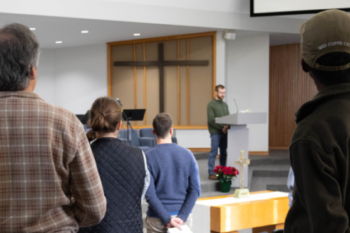Lament As a Means to Flourishing
We were lying in bed. For days, she had been languishing with nearly unbearable pain. Most mornings, we were unsure if she would be able to get up out of bed, to eat, to drink, or to move downstairs. But this day she had spent a few hours in the sunlight and talking with her friends. Then she turned to me and said, “I feel so empty.” In those words, I heard what she did not want me to know. We had lost a baby we could never have, a child we would always love but never hold. A child we still mourn, and a miscarriage which caused irreparable damage to her body. After that moment, we have spent mornings ignored by health care professionals and nights wondering if we need to return to the emergency department. Our attempts to find help were met with diagnostic procedures that caused more pain than good, vague talk of cancer, and a general sense of skepticism.
In the midst of those days, we cried many tears, hugged each other tightly, and watched far too much reality TV. But we also heard many well-meaning words of comfort that were far from comforting–from the ubiquitous “I’m praying for you” to the heartfelt “let me know if you need anything” and the dreaded “God must have big plans for you.” Through these words, we have experienced the defense of God’s goodness in the words of people who want to help us, and it hurts.
But in the intensity of mourning, the oppressive weight of loss is enough. Sufferers do not need to be preoccupied by a justification of God’s goodness. They need to lament.
In the West, we have become experts at using philosophy to distance ourselves from pain, loss, and grief. At the graveside of a young man, at the news of a military invasion, and in the dark days of isolation, we respond with a philosophical explanation of God’s relationship to suffering and expect it to be enough to overcome the reality of death-dealing forces in this broken world. At the moment when humans feel the most loss, when they feel their agency slipping out of their hands, they are more likely to hear a defense of God’s justice than a voice of shared pain. Somehow, we have made explaining our suffering the only way to flourish. In other words, we have become convinced that we must vehemently defend a certain kind of God while relinquishing our right to lament in order to live life well.
Modernity’s most sustained attempt to achieve flourishing in the face of systemic suffering has been theodicy. But theodicy does not belong in the space of grief. Perhaps, long after the traumatic event, a theodicy might be born. But in the intensity of mourning, the oppressive weight of loss is enough. Sufferers do not need to be preoccupied by a justification of God’s goodness. They need to lament.
In the opening lines of the book of Job, we find a human being who has been broken by the seemingly insurmountable reality of loss. His family has died, his wealth has been stripped from him, and his own body is unreliable. Job is in the midst of unmerited suffering and his friends want to reason with him. They want to know what great sin of Job has brought this calamity, and they are convinced that the kind of God they believe in would never allow a righteous man to suffer. Job confronts his friends with a clear denial of any wrongdoing and a blistering critique of a hidden Yahweh. In Job 16:6–17, Job describes God as the gnasher of teeth, the one who shattered him, the warrior who ravished him, and his deliverer to evil. In his lament, Job lets his pain fall from his mouth, and he names God as the cause of his pain. He does not hold back and does not refrain from naming the kind of God he is experiencing.
We expect to find Job soundly reprimanded for his words at the end of the book. Instead, God calls Job’s words “right” twice in 42:7-8. God is not incensed at the human who railed against God, but God’s harshest words are for the ones who sought to defend orthodoxy. Job found that God could handle the worst of his accusations, and God surprised us all by calling Job right. Put simply, lament is expected and proper in the relationship between God and humans.
Lament, especially within the Hebrew Bible, is the correct response to unmerited suffering. For Job, it was the beginning of recognizing who he was and what he could do. Every tragedy Job faced brought him closer to complete despair, but embers of his agency remained. He used that agency to lament, fanning those embers into resistance, a resistance God called right. The book of Job depicts lament as words from the grieving, for the grieving, and shared with the humans closest to the grieving. Disclosure of pain is the necessary reaction to suffering.
Lament, especially within the Hebrew Bible, is the correct response to unmerited suffering.
During our nights of ED trips and our days of rejection, we wanted nothing more than to cry together. To wallow in the overwhelming reality of unadulterated pain–a lament we shared with our closest friends and which allowed us to see our own agency.
Most acts of shared suffering were small, a simple “oh friend, that’s so hard” or “I am going to bring you coffee tomorrow” was enough to mourn together without the burden of theodicy. In those words, we saw that not all had been stripped from us, we could still love, could still share life with another human, and could still cry out in pain. No matter how oppressive the weight of suffering, we found the embers of agency and allowed our lament to fan them into something a little closer to flourishing.
Within the church, lament can name the pain of individual humans and invite us to suffer with one another
When lament is shared in a communal context, lament gives voice to the oppressed. In honoring their voices, we fan the embers of their agency and participate in healthy disclosure. For those more privileged or experiencing a season of flourishing, lament helps reveal their own high level of agency and invites them to speak and act on another’s behalf. Lament acts to level the social situation of the members in a community, encouraging them all to act on behalf of their co-sufferers.
Within the church, lament can name the pain of individual humans and invite us to suffer with one another. The reality of life in a broken world means that we have all suffered something. In the act of suffering with other human beings, we might act as a community related to God, flourishing in the face of enduring and systemic suffering.
A Few Questions
- How do you think lament might fit into your church or community context?
- If lament became a regular experience, do you think anything would change? What might be a product if lament was included in your liturgy this coming Sunday?
- Have you ever responded to pain with lament? What was the result? How was your relationship with that person changed? How about with theodicy? Was it different?
- What type of metaphors can you use to talk about grief and those experiencing pain?
Lament in Liturgy
The following are a few ideas for incorporating lament into congregational or community life:
- Lean into preaching Job, Lament Psalms, and other stories of lament (Naomi, Hannah, David, the people of Israel in Exodus, the pattern of Judges, Lamentations, many of the prophets, and Jesus in Gethsemane).
- If small groups are a part of your context, encourage them to participate in appropriate vulnerability with one another. Intentional space to share suffering can go a long way in building trust while lamenting together. (Of course, this does require defining “appropriate vulnerability” but that is a conversation for another time).
- Participate in appropriate vulnerability as a pastor, church leader, or in other spiritual settings. This helps to create a context where lament is encouraged and set a precedent for listening to one another.
- Use lament psalms as liturgical examples and spend time reading them as a community.
- So much of the culture we set is anchored in the words we say to specific humans, Kate Bowler provides a wonderful resource for being in community as co-sufferers. Check out her appendices in Everything Happens for a Reason for things not to say and ways to lovingly respond to those in pain. It is not a complete list, just a good place to start.
Selected Resources
Berry, Wendell. The Unsettling of America.
Boase, Elizabeth and Christopher G. Frechette, eds. Bible Through the Lens of Trauma.
Bowler, Kate. Everything Happens for a Reason: And Other Lies I’ve Loved (she reads her own audiobook, and it is excellent).
Davis, Ellen. Getting Involved with God.
Goldsworthy, Mike. “Space for Faith” Podcast: Episodes 1-4; 6.
Gustavo Gutiérrez. On Job: God-talk and the Suffering of the Innocent.
Fretheim, Terrence. The Suffering of God.
Katongole, Emmanuel. Born from Lament.
Marsall, Ellen Ott. Though the Fig Tree Does Not Blossom.
Westermann, Claus. Praise and Lament in the Psalms.
Spencer Taylor is a current student at Emmanuel Christian Seminary at Milligan. View Emmanuel’s Academic Programs page here.





